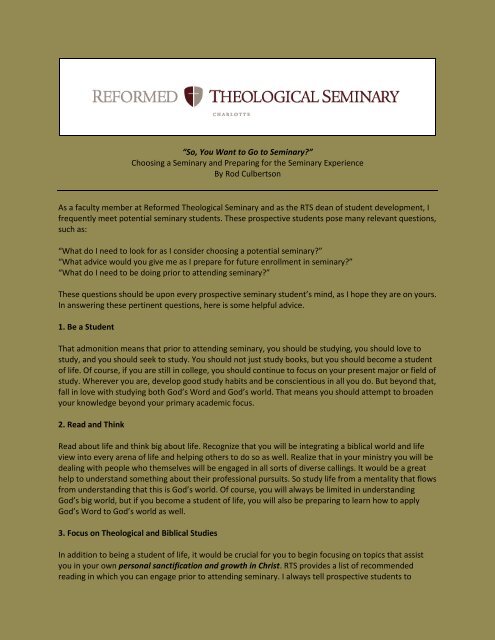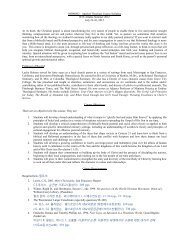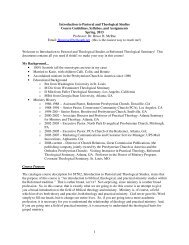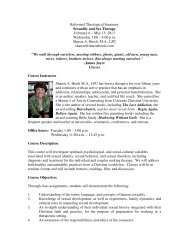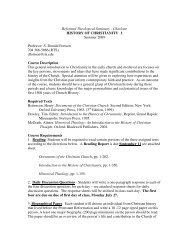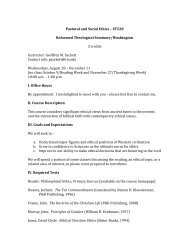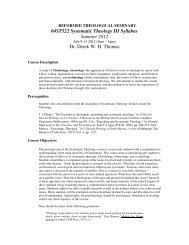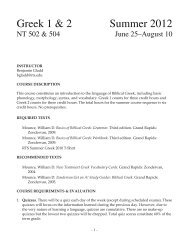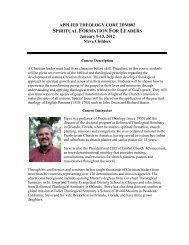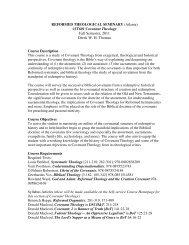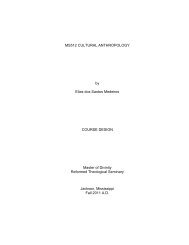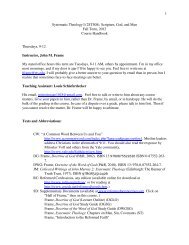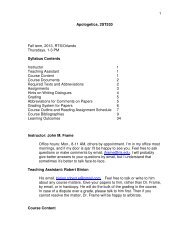Choosing a Seminary - Reformed Theological Seminary
Choosing a Seminary - Reformed Theological Seminary
Choosing a Seminary - Reformed Theological Seminary
You also want an ePaper? Increase the reach of your titles
YUMPU automatically turns print PDFs into web optimized ePapers that Google loves.
“So, You Want to Go to <strong>Seminary</strong>?”<br />
<strong>Choosing</strong> a <strong>Seminary</strong> and Preparing for the <strong>Seminary</strong> Experience<br />
By Rod Culbertson<br />
As a faculty member at <strong>Reformed</strong> <strong>Theological</strong> <strong>Seminary</strong> and as the RTS dean of student development, I<br />
frequently meet potential seminary students. These prospective students pose many relevant questions,<br />
such as:<br />
“What do I need to look for as I consider choosing a potential seminary?”<br />
“What advice would you give me as I prepare for future enrollment in seminary?”<br />
“What do I need to be doing prior to attending seminary?”<br />
These questions should be upon every prospective seminary student’s mind, as I hope they are on yours.<br />
In answering these pertinent questions, here is some helpful advice.<br />
1. Be a Student<br />
That admonition means that prior to attending seminary, you should be studying, you should love to<br />
study, and you should seek to study. You should not just study books, but you should become a student<br />
of life. Of course, if you are still in college, you should continue to focus on your present major or field of<br />
study. Wherever you are, develop good study habits and be conscientious in all you do. But beyond that,<br />
fall in love with studying both God’s Word and God’s world. That means you should attempt to broaden<br />
your knowledge beyond your primary academic focus.<br />
2. Read and Think<br />
Read about life and think big about life. Recognize that you will be integrating a biblical world and life<br />
view into every arena of life and helping others to do so as well. Realize that in your ministry you will be<br />
dealing with people who themselves will be engaged in all sorts of diverse callings. It would be a great<br />
help to understand something about their professional pursuits. So study life from a mentality that flows<br />
from understanding that this is God’s world. Of course, you will always be limited in understanding<br />
God’s big world, but if you become a student of life, you will also be preparing to learn how to apply<br />
God’s Word to God’s world as well.<br />
3. Focus on <strong>Theological</strong> and Biblical Studies<br />
In addition to being a student of life, it would be crucial for you to begin focusing on topics that assist<br />
you in your own personal sanctification and growth in Christ. RTS provides a list of recommended<br />
reading in which you can engage prior to attending seminary. I always tell prospective students to
consider reading the modern classic Knowing God by Dr. J. I. Packer. This book is a marvelous blend of<br />
biblically based theology written so that the reader is moved to love God more. If you can handle<br />
Packer’s thought-provoking style and depth of reasoning, you will be ready and eager for a seminary<br />
experience that gives you a greater love for the living, personal God you want to serve. Also, accessing<br />
and listening to courses on iTunesU is a great introduction to the seminary classroom environment.<br />
These three suggestions deal primarily with “academic” preparation. Of course, as an academic<br />
institution, any seminary would expect an incoming student to want to study, so reading is an important<br />
prerequisite. However, you may wonder what else to do to prepare for the seminary experience.<br />
An obvious, but sometimes overlooked, answer would be this: practice! That is, be sure to do ministry of<br />
some type. If you have not been or are not already involved in some type of ministry, find a place of<br />
service where you can be exposed to and grow in practical ministry. You might find this hands-on<br />
ministry experience in your home church, the church you attend wherever you are presently located, or<br />
in a local parachurch ministry. Whatever and wherever, you need to be with people who need Jesus and<br />
His powerful gospel so as to share the love of Christ and the message of the gospel with them. And if, in<br />
the process, you can use speaking and teaching gifts, that would be a bonus.<br />
Speak with your pastor or some other Christian leader to discover how you might volunteer (you<br />
probably won’t get paid, but that really isn’t the purpose). Seeing the reality of people as sinners in need<br />
of the gospel is a vital means of growing in your passion for more training. Over the years, I have learned<br />
that the most motivated seminary students are usually those already involved in ministry in some<br />
capacity. For these people, the need for seminary training becomes more relevant and precious as they<br />
learn and refine newly discovered skills.<br />
On a personal level, the primary preparation for anyone planning to attend seminary is to seek Christ<br />
and the Christian character that follows from a daily walk with Him. Make your personal sanctification<br />
(Christ-likeness) your absolute priority. Spend time in God’s Word and in prayer. Study the Word, but be<br />
sure to reflect and meditate on the personal implications of Scripture in your life. Make time to seek<br />
Christ and to worship Him. Practice daily devotion with heartfelt passion. Your relationship with Christ<br />
must be your most focused relationship. It lasts forever, whether you attend seminary or not. A quote<br />
from St. Augustine best expresses this: "This Lord, our God, the Word of God, the Word made flesh, the<br />
Son of the Father, the Son of God, the Son of man, exalted that He might create us, humbled that He<br />
might recreate us, walking among men, suffering what is human, concealing what is divine. Let every<br />
sigh be a panting after Christ, let that most beautiful One, who loved even the ugly that He might make<br />
them beautiful, let Him be longed for. Hurry to Him alone, sigh for Him." Oh, how we want to have<br />
students, professors, and staff members with a passion and a longing for knowing Christ Jesus!<br />
One final thought regarding preparation for seminary may be sensitive and awkward: If you are not<br />
already married, strongly consider finding a mate committed to ministry. Of course, this doesn’t need<br />
to happen prior to attending seminary, but I believe that a married person going into full-time ministry<br />
needs a spouse 100% committed to being a minister’s (or Christian worker’s) spouse. A minister’s wife,<br />
for instance, doesn’t have to be 100% committed to involvement in the life of the local church, but she<br />
should be committed to 100% support of her husband as he serves the church. Often a spouse who<br />
comes to seminary with her husband is reluctant to do so or is reticent toward entering the ministry<br />
with him (because of the fears or unrealistic expectations often placed on the spouse of a pastor).
I think this situation needs to be remedied in time; often it is solved during the seminary experience, as<br />
the vision for both the demands and the benefits of the ministry are realized and accepted by the<br />
previously unwilling spouse. From my vantage point, however, I only see problems for a graduating<br />
seminary student who heads into ministry with an unsupportive spouse. Ministry is a team effort. Of<br />
course, you may be called to minister as a single person, like the Apostle Paul, but if you desire to be<br />
married, I am simply attempting to provide wise counsel to a critical consideration in ministry.<br />
Ultimately, this is a matter for serious prayer.<br />
(As an added, helpful resource, please see Learning at Jesus’ Feet, by Dr. John Frame.)<br />
How to Discern Your Calling<br />
If you are heading toward seminary or praying about that decision, I would assume you have perceived a<br />
personal sense of God’s calling in your life. If this is indeed the case, I believe we can hold these basic<br />
assumptions regarding your personal experience:<br />
<br />
<br />
<br />
You are a Christian — i.e., you know Christ personally and have entrusted yourself to Him<br />
for your own salvation.<br />
You are committed to Christ — i.e., you have demonstrated a desire to submit to Christ’s<br />
Lordship and God’s Word, and God is working in your life.<br />
You have a love for Christ’s bride: the church.<br />
If these realities exist in your life, then the next question to consider is your calling to ministry.<br />
Let’s begin with what is termed the internal call. The internal call is apparent when you can state that<br />
you personally sense a call from God – you know that God is working in your life and seems to be leading<br />
you to serve Him in full-time ministry. Just to clarify, I define a call to the ministry as “all of your time<br />
(full time, not part time), all of your life (you can do nothing else with your life), for the rest of your life.”<br />
In addition to this sense of calling, one aspect of the internal call is a realization that you have desires for<br />
ministry — i.e. inclinations and a magnetic draw to do something you quite possibly never thought you<br />
would want to do or be able to do. You have begun to see fruit from your ministry efforts; something<br />
seems to happen in other people’s lives whenever you find yourself in a place of service for the Lord.<br />
You also recognize capabilities in ministry settings – you are developing and discovering useful gifts.<br />
And best of all, you realize it’s not about you; it’s about the Lord and His working through your life. You<br />
have learned to die to self, growing to value the “unworldly” attributes of servanthood and humility. You<br />
have discovered that leading is based upon serving, and serving is what you want to do with the rest of<br />
your life — something you never thought could be. But as you have learned to walk by faith, you are<br />
ready to trust God more than ever before for your future and your needs. You are learning to give your<br />
worries over to Him (this attitude will become very relevant in future ministry experience). The bottom<br />
line defining one’s sense of internal call is that you can’t see yourself doing anything else but ministry.<br />
This brings us to the external call. The external call complements the internal call and confirms it. Simply<br />
stated, the external call describes the reality that others, those who know you and whom God has<br />
placed in your life, have also discerned your calling to ministry, observing gifts commensurate to this<br />
calling. These outside observers have seen fruit born in your ministry and believe that this fruit bearing<br />
is a work of God. These others are mature Christians – pastors, elders, deacons, church members or<br />
parachurch staff members – who, working closely with you, confirm your sense of calling to ministry.
One of the most significantly memorable statements I ever heard, a remark given prior to my third and<br />
final year of seminary, was made by my pastor, under whom I had served for three months as a summer<br />
intern. I was doing youth, college and some adult ministry, including preaching three of my earliest<br />
sermons (I’m sorry he and the church had to endure those trials). Although I was certain that the<br />
summer had been fruitful and had deepened my internal call to ministry, my pastor sat down with me at<br />
the end of the internship and said, “Well, it certainly appears you have a call to the ministry. I have<br />
observed that to be true this summer.” This pastor never knew how much that brief statement meant to<br />
me. Those words gave me a depth of reassurance – a confirmation from a credible outside source – that<br />
I should continue to pursue the call I believed God had placed in my heart. Confirmation of the external<br />
call of God on your life is wonderful, bringing a sense of settled peace in your soul.<br />
When certain of your call, though, please beware of thinking that if you enter the ministry, you are<br />
called (and/or are able) to “save the world!” In reality, your calling to kingdom service is simply to<br />
faithfully proclaim the gospel wherever God plants you in ministry. So set your sights on walking humbly<br />
with Him and letting Him bless your work as He sees fit.<br />
At this point you may wonder, “What is the place and role of seminary in pursuing or defining my call to<br />
ministry?” Simply stated, seminary often helps mature the internal call and confirm the external call. I<br />
have observed that at least half the students who attend seminary initially have some sense of calling to<br />
ministry, but upon entering seminary, are still quite uncertain about their calling (especially concerning<br />
preaching sermons and leading a congregation). Many students attend seminary still wondering if God is<br />
calling them to full-time Christian service. We might say they are exploring their calling.<br />
<strong>Seminary</strong> is a great place to do such exploration. Your professors, classmates and (in a much greater<br />
way) pastor(s) can provide confirmation regarding your call to ministry. But I should mention that if your<br />
internal call has not been affirmed in some manner by an external call, you might be wise to wait before<br />
entering seminary. Also keep in mind that just because you attend seminary and complete a degree<br />
does not mean you should be in ministry or are called to ministry. A seminary degree does not<br />
necessarily validate calling to and giftedness for ministry. You might have the degree, but not the calling.<br />
But no matter what happens, you will have a biblically based education that will provide a foundation<br />
for life in God’s church and kingdom for the rest of your life, whether ordained or not.<br />
(As an added, helpful resource, please read Discerning God’s Call on Your Life by Dr. Mike Milton and<br />
Studying Theology as a Servant of Jesus by Dr. John Frame.)<br />
How to Choose a <strong>Seminary</strong><br />
There are a number of issues to contemplate when considering your specific choice of a seminary. This<br />
pamphlet is not designed to lead you directly to RTS. There are many wonderful seminaries throughout<br />
the United States and beyond, and you could be overwhelmed as you search them out. But as you look<br />
and weigh the choices, there are factors you should ponder.<br />
First, but not necessarily foremost, is accreditation. RTS is accredited by the Association of <strong>Theological</strong><br />
Schools (and the Southern Association of Colleges and Schools). The accreditation process, in essence,<br />
provides quality control for any institution that is a member of the association. Some seminaries are not<br />
accredited by ATS, which is not a purely evangelical association. I respect the decision of those<br />
seminaries, primarily because their rationale is usually that their work should be “approved by God,” not
a man-made organization. However, ATS accreditation, although not flawless, does provide a checklist<br />
for some of the important academic standards we value at RTS. A good accreditation organization will<br />
ensure that a member school has high standards in some of the following areas:<br />
<br />
<br />
<br />
<br />
Quality of the faculty — i.e. the seminary’s faculty has the appropriate scholarly degrees for<br />
their field of instruction, ensuring quality academic standards and classroom instruction. For<br />
instance, if a seminary hires only its own graduates as classroom instructors (in an effort to<br />
maintain its specific tradition), students might receive a restricted or narrow perspective in<br />
their education. Accreditation prevents such a “pipeline” mentality in a given seminary, thus<br />
enhancing the breadth of the education experience.<br />
A quality library — accreditation associations demand that a library provides qualified<br />
library personnel, and both a high number and quality of research materials and books.<br />
High standards in student life and service, admissions, financial stability, etc.<br />
Many Ph.D. and Doctor of Ministry programs will not accept students who have attended<br />
non-accredited or improperly accredited seminaries. You don’t want to find that out on the<br />
back end of your degree. Sadly, I have met a number of students who were unable to enter<br />
desired programs because of study at a non-accredited or a poorly accredited institution.<br />
Second, look very closely at the seminary’s biblical commitments. Directly ask the representatives,<br />
“What is your school’s view of Scripture?” Of course, almost every seminary will state that they have a<br />
high view of the Bible. But as the prospective student, you must probe more deeply into the initial<br />
answer. Ask questions like:<br />
“What does ‘a high view of Scripture’ mean to your faculty?”<br />
“What is your view of inerrancy, inspiration and infallibility?”<br />
“What are your views of higher criticism?”<br />
“What are your views of expository and/or Christ-centered preaching?”<br />
You are attempting to discover the underlying presuppositions regarding Scripture that drive the<br />
curriculum and the classroom instruction. The seminary should have a clearly articulated statement of<br />
its view of the Bible, so carefully search the catalog and other materials, as well as ask the hard<br />
questions mentioned above, in order to discover where the seminary really stands.<br />
Next, examine the seminary’s theological commitments. Find out where the school lands on the<br />
continuum between conservative (or even ultra-conservative) and liberal theology. The school’s position<br />
on Scripture often determines its place on the conservative-to-liberal continuum. The theological<br />
position most likely permeates the ethos of the school, its faculty and the classroom training you will<br />
receive. Also, if the school falls into a theological tradition, particularly one that will heavily impact the<br />
distinctive training of the institution, you will want to be aware of this influence. Various traditions<br />
might include <strong>Reformed</strong>, Arminian, dispensational, liberal, eschatological, etc.<br />
Denominational seminaries almost always reflect the flavor of their particular tradition, so they could<br />
be permeated by their denominational perspective. If leaning toward entering a specific denomination,<br />
you would be wise to consider a seminary sponsored or supported by that denomination. You might find<br />
an advantage for future placement through the denominational label. An exception would be to choose<br />
an interdenominational or nondenominational seminary, or one that serves various denominational<br />
traditions. But be sure your denomination will accept graduates from the nondenominational seminary<br />
you choose to attend. Another question to ask yourself is, “Do I want to be identified with a particular
denominational label for the rest of my ministerial career?” Some students desire a denominational<br />
affiliation, while others feel constrained or stereotyped by it. You’ll need to decide which is true for you.<br />
Another consideration would be to understand how the school handles or addresses traditions other<br />
than its own. What breadth of exposure does the seminary provide to various church traditions and<br />
theologies? Does it treat traditions different from its own in a fair, gracious fashion? Does it highlight the<br />
positive contributions of traditions that are different from its own? Does the seminary enhance unity in<br />
the diverse body of Christ? You want to come out of seminary appreciating the vast, diverse body of<br />
Christ, not as someone overly critical and suspicious of others who truly claim the name of Christ in an<br />
orthodox manner. We at RTS strive to emphasize this as we serve the greater kingdom of God.<br />
As you begin your adventure of looking at and inquiring into various seminaries, you will quickly discover<br />
that each school has its own unique purpose and distinguishing personality. You will ask, “For what is<br />
this seminary known?” Some are known for training missionaries, others have a reputation for training<br />
strong preachers, while still others may focus on pastoral ministry or leadership, evangelism, counseling,<br />
academics, etc. If you have a strong proclivity toward one of these areas, that inclination will probably<br />
guide you toward a particular seminary that reflects that particular emphasis in its personality.<br />
Other significant factors, as you follow God’s leading in your search for the right seminary, include:<br />
Programs Offered<br />
Of course, the Master of Divinity is normally the linchpin degree for any seminary. The M.Div. degree is<br />
designed to train pastors and is normally a three-year degree program providing a heightened focus in<br />
biblical studies, systematic theology, church history, the biblical languages (Greek and Hebrew) and<br />
practical theology, including courses on Christian living and growth. Every seminary campus will include<br />
Master of Arts degrees in Bible or theology, since the courses for the M.A. degrees are the same as<br />
those offered in the M.Div. degree. The M.A. degree is a great means of preparation for someone<br />
wanting to become a Christian schoolteacher, serve on the mission field, or pursue other church<br />
positions that might complement a senior pastor. Normally, however, I advise students to strongly<br />
consider the M.Div. degree, no matter what their long-range goals are, since that degree opens up so<br />
many doors of opportunity in ministry and is respected around the world. The M.Div. is also great<br />
preparation for those interested in doing future Ph.D. work. You may also want to ask about how many<br />
courses or credit hours are required to graduate, how many years does the average student take to<br />
graduate, how many credits are required in comparison to other seminaries, and the value of a more<br />
extensive curriculum.<br />
Other programs a seminary might offer include missions and/or intercultural studies, counseling,<br />
marriage and family therapy, a Master of Theology (Th.M.), Christian education, Christian leadership,<br />
urban studies, evangelism, Christian thought, archaeology, philosophy of religion, etc. Many degree<br />
programs include specializations or emphasis tracks in which you might be interested. An emphasis<br />
track is created either by using elective courses in an area of special interest or by swapping out some<br />
required courses for these specially designed electives. These specializations could include youth<br />
ministry, counseling, worship, missions, campus ministry, chaplain ministry, urban studies, leadership,<br />
exegesis and/or a focus in the use of languages. Specializations are only a small factor in choosing a<br />
seminary, as the bulk of the curriculum is the most crucial aspect of your training, but the long-range or<br />
life goal you have for your ministry, assuming you know it, could be a factor in your selection of a<br />
seminary.
Accessibility and Flexibility<br />
Other questions you should try to answer are whether or not the courses offered by the seminary are<br />
accessible to you. For example, can you take the courses in a convenient manner? Is the course schedule<br />
conducive to a commuter? Is it sensitive to one who works part time or full time in ministry? Are there<br />
evening and/or weekend classes? Does the seminary have a quality virtual campus or multiple virtual<br />
courses, and how helpful and comprehensive are those virtual course offerings? Will those virtual<br />
courses fit into your chosen curriculum and thus help you fulfill degree completion? Is the curriculum<br />
flexible enough to enable you to take courses out of sequence if necessary?<br />
Further Concerns<br />
When looking at or visiting (which I highly recommend, if at all possible) a seminary campus, here are<br />
some other items for your discernment and reflection:<br />
<br />
<br />
<br />
The faculty — What are their credentials? Where did they study? What degrees have they<br />
earned? How do they reflect their love for the Lord? Are they a diverse group? What is their<br />
past experience in ministry? Have they written or published either scholarly or practical<br />
and/or helpful literature? Possibly most importantly, are they accessible to students? You<br />
will want to learn from the faculty in the classroom setting, but you also want informal,<br />
personal interaction and discussion with them about both theological and ministry issues<br />
and questions. Some faculty will hold small-group meetings or prayer meetings with<br />
students on campus, in their homes, or in other off-campus locations. These unstructured<br />
meetings provide valuable encounters for seminary students as they interact with faculty<br />
members on a deeper level outside the classroom.<br />
Mentoring opportunities – Try to inquire about the availability of faculty mentors or local<br />
mentors, influential people who become a part of your life while you attend seminary. Some<br />
seminaries require a matriculating student to have at least one pastoral mentor while<br />
journeying through the seminary experience. I know of at least one seminary that requires<br />
the student to have four mentors, most of whom they supply. Whether required or not,<br />
seek out a mentor. If the seminary is in a city filled with churches, you will likely find a local<br />
pastor to mentor you during your seminary years. The best mentor may be the local pastor<br />
who takes you under his wing and exposes you to all he knows about ministry.<br />
The Library – This is still one of the most important components of the seminary experience.<br />
Any premier seminary will require you to study, think, read, research, critique ideas and<br />
write quality academic papers. You will want to be confident that your seminary library has<br />
adequate resources for your research — books and scholarly journals, both in print and<br />
online. Inquire about an inter-campus library loan system or partnerships with other local<br />
libraries. A helpful, degreed librarian and library staff is also a very important asset to your<br />
seminary education, as they are trained to help you sift through the sea of information out<br />
there and find what is useful. Ask present students about their experiences with the<br />
seminary library. In addition, walk through it to see if it offers good places to study, as there<br />
is much to be said for studying in the same building where you find the resources you need.
Tuition cost and financial aid – Education is expensive, no matter where you attend school.<br />
Graduate school is particularly pricey, and seminary is no different. All seminaries try to be<br />
competitive with tuition costs, truly wanting to assist those called to ministry, and their<br />
primary means of assistance is through financial aid or scholarships. Tuition can range from<br />
a low cost due to denominational help (usually assuming you belong to the denomination<br />
that sponsors the seminary) to a high cost due to geographic location (perhaps the seminary<br />
is located in an expensive city or area of the country). Realize that even expensive<br />
seminaries try to compensate for higher tuition by providing prorated scholarships.<br />
Don’t let tuition expense hinder you in your choice of the seminary you prefer to attend. Ask<br />
the appropriate person (the admissions director or the financial aid director) for real help in<br />
the form of financial aid and/or scholarships. Also, be sure to ask your home or sending<br />
church to help you with the tuition costs. They may have some funds designated for<br />
seminary training on behalf of those called to the ministry from their congregation.<br />
<br />
<br />
Housing and facilities – Not all seminaries provide student housing, and those that do offer<br />
housing might only offer it for specific purposes. Some seminaries may have housing for<br />
married students and not much for single students, or vice versa. Usually seminary housing<br />
is going to be less expensive than other local, non-seminary-related housing options. Living<br />
on campus can be a blessing since it gives you access and proximity to campus life and<br />
classes. On-campus housing might also provide access to professors who live on or near<br />
campus, as well as foster seminary community (shared life you enjoy as you live and study<br />
with other students). However, living off campus might be less expensive if you come across<br />
a church or family that makes a spare bedroom or garage apartment available for a special<br />
rate. Another advantage to living off campus is potential interaction with unbelievers. Living<br />
“in the world” while not being “of the world” can be a fantastic asset as you learn to<br />
befriend, minister to and evangelize those outside of Christ’s kingdom while you engage in<br />
the growth that seminary training provides. In considering the campus facility (if you are<br />
able to visit), seek to observe or ask about the community on this campus among the<br />
students, places for people to eat together, student lounges, recreation areas or facilities,<br />
technologically modern and up-to-date classrooms.<br />
Church/ministry opportunities in the area – As mentioned earlier, involvement in a church<br />
while attending seminary is crucial. Seek out and join a local church body as quickly as you<br />
can. This search may take as long as one full semester of visiting various church possibilities<br />
and revisiting your top choices. But once you find the church to which you believe God is<br />
calling you to join while in seminary (possibly for three to five years), you should eventually<br />
find a place or role for service in that church. As you visit a potential seminary, find out how<br />
many churches that sympathize with the seminary’s vision, purpose and/or theology exist in<br />
the vicinity of the seminary, and if there are ministry opportunities (particularly seminary<br />
internships) available to the students in these local churches.<br />
If there are a lot of churches in general proximity to the seminary (within a one-hour radius),<br />
you will have a greater opportunity to learn ministry “on the job” and in a real-life context.<br />
Whether or not paid internships are an option, meet with a member of the pastoral staff of<br />
your church, and volunteer to help serve in some area of ministry, particularly an area in<br />
which you have some interest or gifting (don’t volunteer to preach regularly, however!). A<br />
volunteer position could eventually become a paid position, even if only part time! The local
church is where you often find the best context for personal growth, spiritual growth,<br />
personal and family support, and actual mentoring by a seasoned and caring pastor.<br />
<strong>Seminary</strong> professors can be effective mentors as well, but be sure to find a pastor who will<br />
know you well and prepare you for life and ministry in the local church. One word of caution<br />
about working or doing ministry while in seminary: it is wise to avoid working full time while<br />
taking classes full time. Something vital in your life will suffer, whether your health, your<br />
marriage, your ministry or your walk with the Lord. If you are working, take your time going<br />
through seminary if possible.<br />
<br />
Geographic location – The location of a seminary campus is an important factor in the<br />
choosing process. RTS has a unique perspective in this regard, since we have multiple<br />
campus locations. We have discovered that most of our graduates are hired within the<br />
general area or region in which the campus is located. This process is created by various<br />
factors: 1) You will probably join a church or come under care of a regional church body that<br />
will get to know you well for three-plus years. Your church or a nearby church might hire<br />
you because they have gotten to know you over the previous years. 2) Through your years<br />
of your seminary training, you will do a lot of networking, either through denominational<br />
connections or general Christian contacts in the area. Those local or regional contacts may<br />
be the means to your first full-time ministry position. 3) You may fall in love with or gain a<br />
greater vision for the city or region in which your seminary is located. The Lord may move<br />
your heart to minister there as you see the needs of the area. 4) Your professors may be<br />
very influential in their seminary locale and could provide a strong and respectable<br />
recommendation for you among the churches in the immediate area.<br />
Obviously there are exceptions to this geographic consideration. Students may be<br />
connected to a distant city or church of origin. Or they may be led into foreign missions,<br />
church planting in another area of the country, campus ministry or the chaplaincy, all which<br />
may take them far away from their seminary location. But here at RTS, we’ve observed that<br />
a high percentage of graduates end up within a few hours of our respective campuses.<br />
<br />
Student life and the student body – Another consideration would be the nature and<br />
makeup of the student body. Is it mostly male students (as typical of conservative<br />
seminaries)? If so, how many female students attend? What degree programs are the<br />
students in, and how do the numbers break down? Is there a diverse character to the<br />
student body? Are other ethnic groups represented? Are there international students? Are<br />
multiple denominations represented? Diverse ethnicities, nationalities and denominational<br />
backgrounds can help create a healthy, dynamic seminary environment, as the status quo<br />
may be challenged or at least properly questioned. They also expose students to the various<br />
needs of the world and the church. These distinctions become a daily reality in the seminary<br />
setting when international students are a vital part of the student body.<br />
Additionally, you may ask about the average age or the generational makeup of the<br />
students. Are they mostly married or mostly single? How will you fit in, whatever<br />
demographic you fill? Is there a sense of community among the students (particularly if<br />
there is no housing on campus)? Do the students appear to enjoy each other and the<br />
seminary community? Does this campus look like a place where you can find friends,<br />
especially potential ministry friends you will keep for life? If you are a woman, you want to
know if there is a ministry for women students on campus. If you have a spouse, you want<br />
to inquire about whether there is a seminary ministry for the spouses of the students.<br />
<br />
Consider the graduates – Lastly, you want to inquire about recent graduates of the<br />
seminary, and any overall patterns that might follow the graduates. Who are the graduates?<br />
Where do they serve? Are they serving primarily in a particular denomination? Are they<br />
mostly pastors, missionaries, campus ministers, chaplains, youth directors, etc.? Do the<br />
graduates reflect the personality of the seminary? Are there any significant leaders or<br />
authors who attended? Is the seminary known for producing solid, steady pastors who<br />
reflect longevity in the ministry? Is it known for producing preachers, and if so, do the<br />
graduates reflect a specific preaching style? Do all the graduates appear to do ministry and<br />
preach the same, demonstrating a “cookie cutter” style of training? Is there a narrow view<br />
of methods, philosophy of ministry, theological persuasion or preaching style? Is there<br />
narrow or highly critical thinking, or conversely a compromising spirit (extreme tolerance),<br />
among the graduates? Are the graduates mostly happy with the training they received from<br />
the seminary (beware the unreasonable critic who could be simply too hard to please)?<br />
Find out if you can contact an alumnus or two, and then ask them about their impressions<br />
(strengths and weaknesses) of the school. Finally, don’t be afraid to ask questions about the<br />
placement process and placement success of the graduates, particularly the most recent<br />
graduates. Feel free to ask the placement director (if there is one) or the admissions director<br />
what the placement process is like, if the school will help in the process, and about the<br />
school’s placement percentage for the past couple of years.<br />
In conclusion, I hope this quick excursion (OK, not so quick) has helped you as you choose a seminary to<br />
attend. Every seminary isn’t for everyone. You should pray for discernment of God’s will as you consider<br />
His calling in your life. <strong>Seminary</strong> training is a valuable asset to any ministry. When you begin to look at<br />
ministry leaders throughout the world, you will find (with some glaring exceptions, of course) that the<br />
men and women who lead in the kingdom of God usually have had some seminary education. This<br />
training has made them more effective leaders wherever the Lord has led them.<br />
May the Lord bless you as you seek to humbly serve Him in His kingdom. He has promised to be with<br />
you always, even unto the end of the age. Be strong and courageous, and walk by faith, living secure in<br />
the finished work of Christ and in the power of the indwelling Holy Spirit.<br />
If I can assist you further in any way, please do not hesitate to contact me at rculbertson@rts.edu.<br />
Rod Culbertson, D.Min.<br />
Associate Professor of Practical Theology<br />
Executive Director<br />
Dean of Student Development<br />
<strong>Reformed</strong> <strong>Theological</strong> <strong>Seminary</strong>, Charlotte, N.C.


